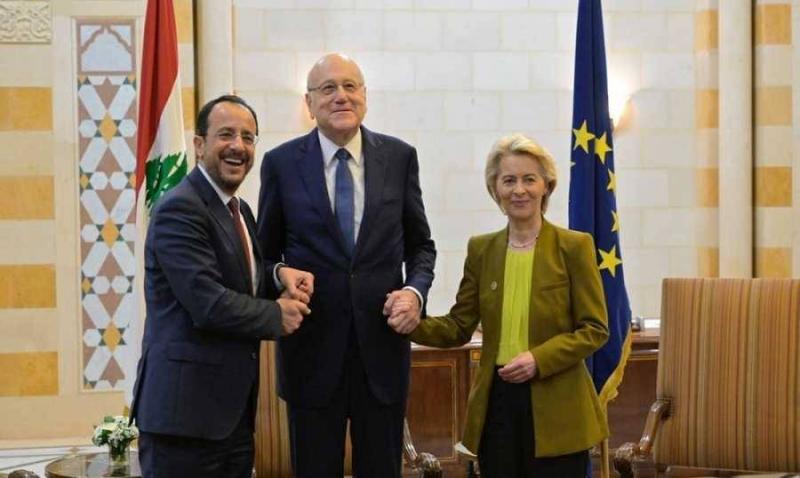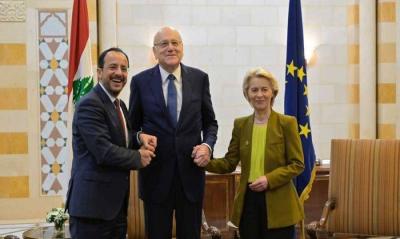Between the Parliament and Bkirki, the billion euro grant from the European Union is being scrutinized for its goals and purposes, especially since it has been labeled as a bribe to keep Syrian refugees on Lebanese territory. The confusion it has caused has made it the main event in the local arena, knowing that this arena needed this grant to reignite discussions on the refugee issue once again. Originally, the opposing forces have not calmed down regarding this presence as they sought to make the issue a priority, especially after the assassination of the Lebanese Forces coordinator in the Jbeil area, Pascal Suleiman, as reported by "Al-Liwaa".
The issue of displacement has been moved from the angle of this assassination, followed by the matter of the grant; in both cases, there is no longer a possibility for the situation regarding the repercussions of displacement to remain as it is. The multiple decisions that were issued by the government failed after they collided with European objections to finding a solution, while communication with Syrian authorities remained timid, limited to verbal promises without documentation. The deportation of illegal Syrians occurs sporadically, and the distance between the two remains significant. However, today, the grant file came to raise concerns about turning displacement into resettlement, or at least something less than that. The key to the solution is Lebanese-Syrian-Western, yet the processing has not advanced, whether through procedures bearing the signatures of the Cabinet or concerned security bodies. The problem of illegal crossings remains unchanged, and the required documents are sometimes monitored and sometimes the monitoring is overlooked.
The session of Parliament dedicated to the grant and inquiries about it will not discuss the issue of refugees in detail, as the parliament does not have executive power and its role here is primarily supervisory, as has become clear. So what is the anticipated scenario? According to circulating information, there is no specific scenario; rather, the Parliament may issue a recommendation or stance, as the government represented by its Prime Minister Najib Mikati will present what details it has after deputies ask questions, with some raising the bar and calling for a thorough understanding of the circumstances. In this context, informed political sources tell "Al-Liwaa" that this session is added to the record of inquiry sessions, yet it is a legitimate session where deputies prepare to direct various inquiries about the grant and its true purpose. Meanwhile, one parliamentary team considers the grant outdated and stresses that the decision regarding its rightful use is not the core problem, as the story is deeper and relates to the scale of displacement, while noting that Lebanon can no longer bear the burden. It is noteworthy that the consensus on this view regarding the displacement file and its repercussions allows the Parliament to emerge with a united stance.
These sources indicate that any scenario is within the Parliament’s jurisdiction, yet any proposed direction may obligate the government. The goal is not to engage in any argument or neglect the primary issue, which is the European Union's insistence on keeping refugees in Lebanon—a point of widespread political rejection. It is reiterated that some believe there is a budget allocated by the European Union, but it does not reach the treasury, instead going to concerned associations. What the Parliament is discussing is the entire file with the aim of realigning the focus. As for the Christian forces, this grant cannot be swallowed, nor can it be approved to be passed by the government with a mere stroke of a pen. They indicate that if actions in this file continue on multiple fronts, the pressure to address the file appropriately will increase, and the essence remains to continue the battle to the end, emphasizing that perseverance and strict measures are desired.
The meeting at Bkirki was deemed necessary by the same sources, which did not adopt a singular tone. The meeting included concerned ministers and advisors, aiming to advance the file towards a resolution and reinforce decisions made previously regarding voluntary return and the paths leading to this resolution, as well as adherence to earlier decisions regarding refugees, crossings, deportation, and other matters, while the Parliament and government remain responsible for deciding.
Until the Parliament session convenes, communication is navigating its way to avoid any internal disputes or position polarization, as the discussion of the file is not desired to turn into a point of conflict or to be highlighted publicly, given that the file requires significant consensus before anything else. Will the grant be unanimously rejected?




